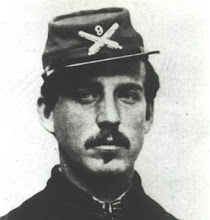
The weekend edition of the Wall Street Journal has a long piece on the persecution of the Dutch cartoonist Gregorius Nekschot by the Netherlands government, a case that Gates of Vienna has been following closely.
Nekschot (a nom de plume) was arrested on May 13 "on suspicion of publishing work which discriminates against Muslims and 'people with dark skins,' " according to the online DutchNews. The arrest, made pursuant to what the Journal termed an "inquiry ... led by an Amsterdam prosecutor unit that specializes in combating neo-Nazis and other hate-mongers," included the confiscation of Nekschot's computer, sketch pads and a hard drive, and the incarceration of the cartoonist overnight. This was the culmination of a three-year investigation of Nekschot "on suspicion that he violated a Dutch law that forbids discrimination on the basis of race, religion or sexual orientation."
That is exactly the kind of law that the likes of Secretary General of the Organization of the Islamic Conference Ekmeleddin Ihsanoglu and U.N. Special Rapporteur "on racism, racial discrimination, xenophobia and related forms of intolerance" Doudou Diène have been pressing Western countries to adopt in order to combat what Ihsanoglu has called the "scourge" of "Islamophobia." That such laws would run roughshod over the fundamental human right to free expression is no concern of theirs; the protection of Islam and its adherents from exposure, analysis, criticism and mockery trumps any such trifles. Speaking to a meeting of OIC foreign ministers in Kampala, Uganda June 18, Ihsanoglu declared "Islamophobia" to be "at the top of our priorities and preoccupations" and bragged that "In confronting the Danish cartoons and the Dutch film 'Fitna', we sent a clear message to the West regarding the red lines that should not be crossed." In a report Diène submitted Feb. 20 to the U.N. Human Rights Council (the report number is A/HRC/7/19; to access it, scroll down to the number and click "E" for the English version), the Senagalese lawyer asserted that "The main challenge is now to define the threshold for legitimately restricting freedom of expression in order to protect the victims." (Emphases mine.)
A Dutch parliamentary inquiry into the Nekschot arrest, the Journal reports, has brought to light something ominous: the existence within the Netherlands government of "a previously secret bureaucratic body, called the Interdepartmental Working Group on Cartoons. ... Headed by a senior bureaucrat from a national agency coordinating counterterrorism, it draws from the intelligence service, the interior minister, the prosecutor's office and various other government bodies." Dutch officials say this group, set up after the Muslim world's tantrum over the Danish Muhammad cartoons in 2006, has "no censorship duties" and "played no part in (Nekschot's) arrest," but such assurances are cold comfort. That a Western government should be so concerned about Ihsanoglu's "red lines" as to have set up such a body is enough to make any freedom-loving person's flesh crawl.
Nor should it be imagined that the United States is all that far away from a European-style designation of certain types of free expression as "hate crimes." Listen to the speeches of presumptive Democratic presidential nominee Barack Obama as he declares that "hate crimes against Hispanic people doubled last year" because a "certain segment has basically been feeding a kind of xenophobia" and "Rush Limbaugh and Lou Dobbs" have been "ginning things up." It is quite clear that Obama views "ginning things up" through criticism of a self-designated victim group as tantamount to inciting hate crimes, and therefore esentially a hate crime in its own right. What "secret bureaucratic bodies" might his administration, backed by a heavily Democratic Congress, set up to deal with those of us who have the temerity to resist the encroachment of Islamic supremacism through the exercise of our right to free expression?


No comments:
Post a Comment